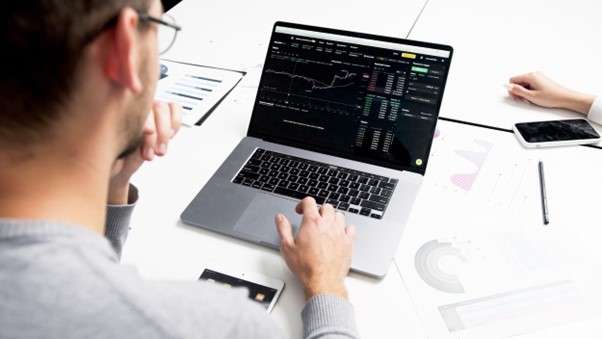Blockchain is transforming the way businesses and individuals communicate with one another, including asset transfers, trade of items, and personal information management. Blockchain can make it easier and safer to provide healthcare, enhance food safety, and enjoy entertainment.
Many people still have inquiries concerning this technology, though: How operates a blockchain? Why is the blockchain relevant?
Everyone can profit from knowing about blockchain technology, especially if they wish to consider investing in digital assets like Bitcoin.
How Does a Blockchain Function?
Blockchain, according to Deloitte, is essentially a safe digital ledger of transactions. To provide immutability and transaction security, these records are dispersed over a distributed database that is shared by all computer network nodes.
Blockchain is a kind of distributed ledger that shows who is in charge of what and who is doing business with whom. Participants throughout the network can view but cannot change the standalone pieces of data, or “blocks,” that are recorded for each transaction. In a “chain,” subsequent transactions are documented in distinct blocks connected to the initial one. Thus, the term blockchain.
More intricate hashes, keys, and network participant-established rules are used in the blockchain’s underlying technology to authenticate data. Both blockchain transactions and participant identities need to be confirmed. Participants in the network develop a shared trust through this process. The verification procedure makes the blockchain ledger “nearly impossible to cheat or hack,” according to the World Economic Forum.
2023 Use Cases for Blockchain Technology
The following list of the most popular Blockchain use cases is divided into several sectors and applications:
1. Smart Contracts
Real-time contracts enforced by smart contracts, based on blockchain technology. They originate from an agreement reached by two or more people without the use of a middleman. Over a dispersed and decentralized Blockchain network, the contract is in place. These days, smart contracts are standard in government organizations, the real estate industry, and healthcare.
Use cases:
BurstIQ
BurstIQ made sensitive medical data transfers between patients and physicians easier by utilizing smart contracts based on big data. The terms and conditions for data exchange are outlined in these contracts. They include additional pertinent information for each patient as well as individualized health plans.
Propy
A Blockchain-based title registration system is used by the real estate site Propy. For brokers, realtors, and their clients, it automates every transaction. Propy enables the instantaneous issuing of titles and the cryptocurrency-based purchase and sale of real estate, thanks to Blockchain technology.
IBM provides a simple-to-read overview of blockchain technology. Alternatively, Berkeley FinTech Boot Camp provides the in-demand skills you’ll need to transition into this exciting new sector if you’re really interested in learning more and maybe moving into a fintech position.
2. Internet of Things (IoT)
With billions of devices connected, the Internet of Things (IoT) market is expanding quickly. Current projections indicate that there will be 50 billion gadgets in use worldwide by 2030. As the number rises, vulnerabilities will rise as well because hackers may quickly access your data by using just one linked device. The likelihood of data breaches can be significantly decreased by incorporating Blockchain technology into Internet of Things devices.
Use cases:
HYPR (IoT/Cybersecurity)
By fusing smartphone technology with the extremely secure FIDO token, HYPR elevates cybersecurity to a new level. This is how its True Passwordless Authentication feature works. HYPR ensures that IoT devices are impenetrable using biometric authentication and decentralized credential solutions.
Xage (IoT/Cybersecurity)
As the world’s first cybersecurity platform based only on Blockchain, Xage claims to serve IoT companies in the manufacturing, transportation, energy, and other sectors. The system from Xage is capable of handling and managing billions of devices at once. For both digital and physical operations in the cloud, OT, and IT, it offers zero trust identification, data protection, and local/remote access.
3. Money Transfer
The best applications of blockchain technology are in money transfer and payment processing. Real-time transactions can happen very quickly because of blockchain technology. Due to its time and money-saving features (which primarily reduce transaction fees levied by banks and other financial institutions), this has already completely changed the BFSI industry.
Use cases:
Circle (FinTech)
Circle helps people launch and manage their online businesses by utilising USD Coin (USDC), the regulated stablecoin that is expanding the quickest. About seven cryptocurrencies (Bitcoin, Monero, Zcash, etc.) are available on the platform. Circle manages bitcoin exchanges and investments worth over $2 billion each month.
Chainalysis (FinTech/Cybersecurity)
Chainalysis provides financial institutions, exchanges, and governments in forty countries with Blockchain data and analytical reports. In essence, its main goal is to support organisations in keeping an eye on bitcoin exchanges. Building a trustworthy Blockchain-based economy is made possible by Chainalysis’s compliance and investigative tools, which let you keep an eye out for and spot money laundering, fraudulent transactions, and compliance infractions.
